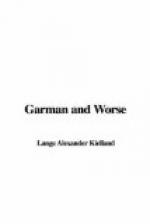“Right you are, my boy!” cried Tom Robson, laughing; “good again. Let us see what you are made of.”
Robson was never so happy as when he could get Martin to talk himself into a fury, which was not a very difficult task.
Ever since his childhood Martin had shown himself of a worthless and cross-grained nature. His character at school was, that he was one of the cleverest and at the same time the most quarrelsome among the boys, and since then he had done nothing but fall foul of everything and everybody he came in contact with. Martin did most of the talking of the four, who already began to be excited by drink. It would perhaps be more correct to say, of the three, for Torpander was not there to drink, but only to be near Marianne. Woodlouse did not say much, for he heard but little; and when Mr. Robson, who had taken on himself the duty of chairman, gave him an opportunity of speaking, Woodlouse used so many strange expressions that the others did not understand him.
Neither did Torpander do much of the talking: for him the event of the evening was Marianne’s return, after which he preferred to sit in silent rapture. This afternoon, however, Torpander joined Martin in his attack on the Garmans, whom he also hated, and poured forth a lot of newspaper tirade about the tyranny of capital, and such like.
“Oh, stop that infernal Swedish jargon!” cried the chairman, “and let us hear what Woodlouse is mumbling about.”
“You see, gentlemen,” began Woodlouse, eagerly, “the right of the proletariat—”
“What does he mean?” shouted Martin.
Woodlouse did not hear the remark, and paused in his speech, as his eyes wandered inquiringly from one to another to see if they were listening.
But Martin could not keep silent any longer, and broke out into a volley of oaths and curses against Garman and Worse, capital, captain, and the whole world, only interrupting himself occasionally to take a drink or light his pipe over the lamp.
Old Anders had at first taken his place by the kitchen door, but that evening they seemed to be pretty quiet, and he was always anxious to hear what they said when the conversation turned upon the firm. He therefore left the door and came up to the table, where Tom Robson made room for him, and at the same time offered him a drink from his mug.
“Thanks, Mr. Robson,” said Begmand, as he put the mug to his lips.
Tom Robson was not only the chairman, but at the same time the host of the company, for it was he who paid for the liquor. By his side on the bench he kept a bottle of rum, from which he every now and then poured out a glass for each. He generally put a good drop of rum into his own beer, “to kill the insects,” he said. He was now occupied in cutting up some cake tobacco to fill his pipe.
“Beautiful tobacco that, Mr. Robson,” said Begmand.
“Take a bit,” answered Tom, good naturedly.




